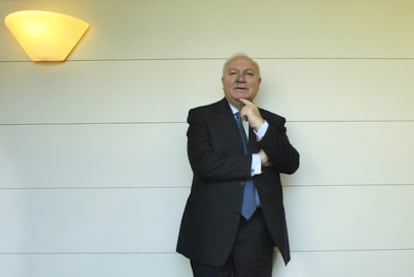"The Bush administration kept relations under constant pressure"
Ex-Foreign Minister Moratinos on WikiLeaks and his bid to head up the FAO
In classified documents released by WikiLeaks last year, the US ambassador to Madrid under the Bush administration wrote that Spain's foreign affairs minister was "selfish" and "unpredictable." Eduardo Aguirre, ambassador between 2005 and 2009, could now add that Miguel Ángel Moratinos is also not one to hold a grudge: in his first interview since he was removed from his post as foreign minister, he said that Aguirre, "despite everything he later wrote, was a good ambassador."
Question. In your farewell speech, you said you regretted leaving without having solved the Western Sahara issue...
Answer. This week's events, the vile murder of two French citizens in Niger and the social uprisings in Tunisia and Algeria all illustrate the price we are paying for the stagnation of the process of integration, modernization and development of the Maghreb. Countries with the greatest interests in the region, such as Spain, as well as the international community as a whole, have been unable to nurture a complete normalization in Algerian and Moroccan relations, which is essential to regional stability.
Q. According to the WikiLeaks cables, Madrid sided with Rabat on the Western Sahara issue...
A. Some sentences from those cables were taken out of context. Spain supports international laws and encourages both sides to work together to find a fair, definitive, mutually acceptable solution that respects the right to self-determination. There has been no change in our position. That does not take away from the fact that this period has been defined by our good relations with Morocco.
Q. As a minister you were close to Morocco, which you visited often. Yet that did not prevent crises and moments of tension.
A. Relations with Morocco have improved greatly though not for personal reasons. I traveled just as frequently to Algeria. Morocco is our neighbor and the more often we go there - not just government but civil society - the better. There have been difficult moments [...] but the main thing is to ensure there is no lack of mutual understanding between both nations.
Q. Are you still optimistic about the Middle East?
A. There is no choice but to be. The conflict is now 64 years old and well on its way to becoming a 100-year war, like in the Middle Ages. There is a stalemate and no short-term solutions in sight; yet the consequences of a non-solution are so serious that they should force the international community into action.
Q. Should Europe recognize the Palestinian state?
A. If we defend the two-state formula and time erodes the possibility of the future Palestinian state, then the sooner we recognize it, the better.
Q. Without Israel's agreement?
A. Ideally there should be a dual recognition: Arab states should acknowledge Israel and Israel should acknowledge the Palestinian state. It's better to do it through negotiation, but we have to ask ourselves how long [we can wait]. Europe must talk to Israel, and underscore the urgency of the situation.
Q. Earlier you held that some statements from the leaked cables were taken out of context. Do you recognize yourself in this sentence? "We are the world's eighth power yet you treat us like a fifth-rate country." You allegedly said it to Ambassador Aguirre in 2006.
A. I don't know if that's the way I said it, but the underlying concept is right. I told him we were the world's eighth-largest economy, which we were then, and that this should command some respect and some interest from the US. A Spanish foreign minister had to convey to the Bush administration the idea that we were loyal allies but also that we needed a greater commitment from them.
Q. The cables reflect moments of tension: the withdrawal from Iraq, the arms sale to Venezuela...
A. They did not have great faith in our government; there were personal perceptions... They were always looking for episodes of tension in order to keep the relationship under pressure - as soon as you dealt with one issue, they came up with another one. But in the end I think they understood that we are a serious country that keeps its word and that we have influence in areas that are important to them.

Tu suscripción se está usando en otro dispositivo
¿Quieres añadir otro usuario a tu suscripción?
Si continúas leyendo en este dispositivo, no se podrá leer en el otro.
FlechaTu suscripción se está usando en otro dispositivo y solo puedes acceder a EL PAÍS desde un dispositivo a la vez.
Si quieres compartir tu cuenta, cambia tu suscripción a la modalidad Premium, así podrás añadir otro usuario. Cada uno accederá con su propia cuenta de email, lo que os permitirá personalizar vuestra experiencia en EL PAÍS.
¿Tienes una suscripción de empresa? Accede aquí para contratar más cuentas.
En el caso de no saber quién está usando tu cuenta, te recomendamos cambiar tu contraseña aquí.
Si decides continuar compartiendo tu cuenta, este mensaje se mostrará en tu dispositivo y en el de la otra persona que está usando tu cuenta de forma indefinida, afectando a tu experiencia de lectura. Puedes consultar aquí los términos y condiciones de la suscripción digital.








































